What are flexible solar panels?, should I use them for my RV, how much they cost and what are the best brands that make them, if these are some of the questions troubling you then this article is for you.
In this article we will discuss everything about flexible solar panels.
What are flexible solar panels:
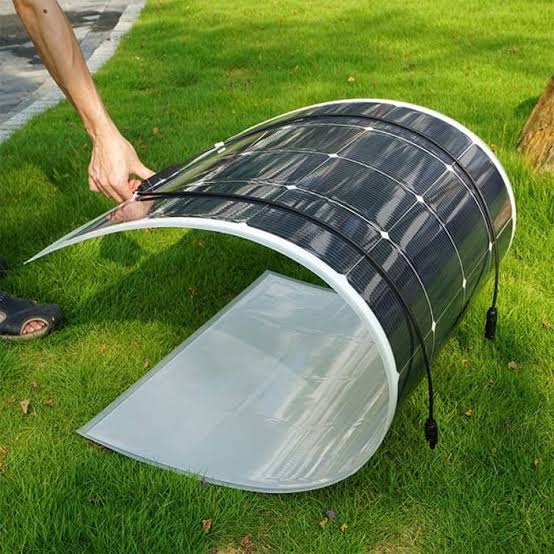
As the name suggest flexible solar panels are flexible in nature. Standard monocrystalline or polycrystalline solar panels are made up of silicon wafers that are typically up to 200 micrometers thick,but in order to make a “flexible” solar panel, these silicon wafers are further sliced down to just a few micrometers thickness.
Unlike crystalline solar panels which are just made up of silicon, flexible solar cells are also made up of Copper Indium Gallium Selenide (CIGS), Cadmium Telluride (Cd-Te) and amorphous silicon.
Common application of flexible solar panels:
- Vehicles: Flexible solar panels are used to make portable solar power systems which can be used on-the-go, for RV’s, automobiles and boats.
- Outdoors: They are used in low-cost off-grid PV systems for homes and cabins. Flexible solar panels are paired with a solar compatible battery and used as portable power for camping, hiking, or hunting.
- Backup Power: Thinfilm / Flexible solar PV panels are paired with solar compatible batteries for backup to power small devices in case of an emergency or power outage.
- Innovative products: Nowadays many consumer durables are being incorporated with flexible solar panels, for example, camping backpacks, mobile phone charger, power banks, caps with solar panels.
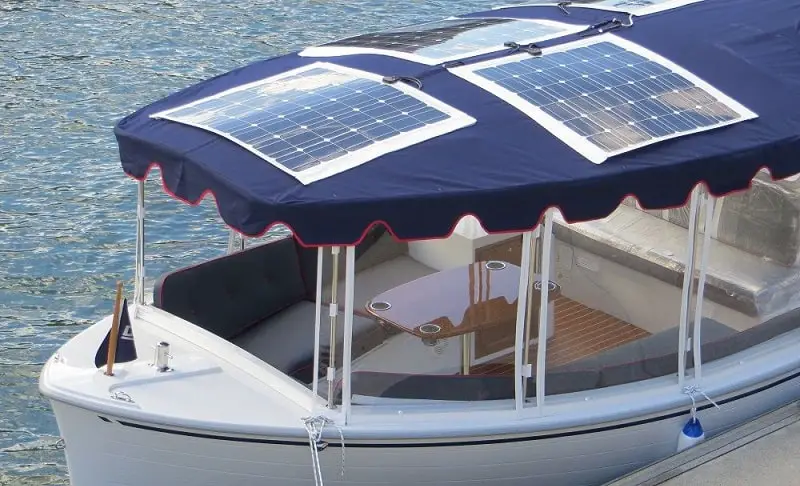
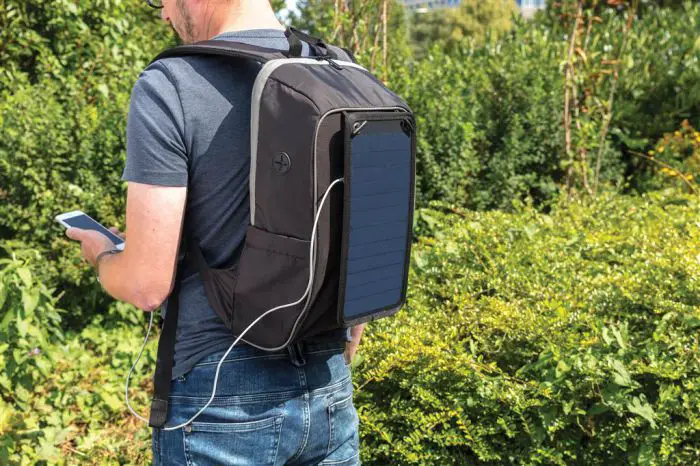
Who to use flexible / thinfilm PV panels:
- If you are going to change your solar panel position again and again then go with flexible solar panels as they are light weight and can be moved anywhere.
- If you want to make a portable charging device for your camping or make some portable DIY system where you want to use solar to power your system, then use these solar panels.
- If your roof is weak and cannot hold the weight of conventional crystalline solar panels than go for thinfilm solar panels.
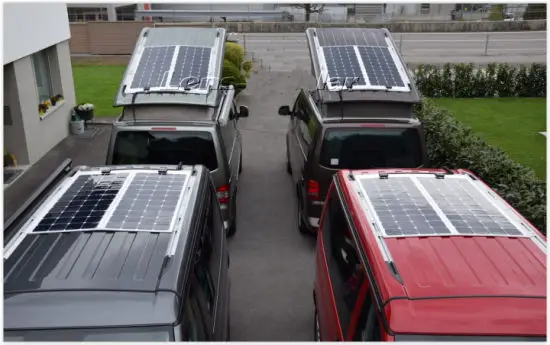
Who to not use flexible / thinfilm PV panels:
- If you are a home owner who is looking for long term use of solar power, then don’t use flexible solar panels as most of them are useless after 5 years of operation. Instead go for conventional monocrystalline or polycrystalline solar panel as they easily last for 25 years.
- If you are not going to move your solar panels in every few months then don’t install flexible solar panels.
- If you have adequate roof area to fulfill your solar requirement then don’t install flexible solar panels.
Flexible solar panels should be used only for low power application and that too to get power on the go. If you are an average home owner who just wants to save electricity bill by generating your own power then these panels are not for you, instead stick with conventional crystalline solar modules, they are cheap, long lasting and much more energy efficient.
Advantage of flexible solar panels:
- Size and Weight: Flexible solar panels are thinner and lighter than a standard rigid panel. For a 100 W panel, you’re looking at nearly a 70% reduction in weight and close to a 95% reduction in thickness. To give you an idea about weight, 160 watt monocrystalline solar weights about 12 kg whereas 160 watt flexible solar panel weights about 3 kg.
- Portability: While rigid solar panels are technically portable, they’re a lot harder to move than flexible ones are. You can stack flexible solar panels in storage space and pull them out when needed. This allows you to set them up at a campsite, lay them out on the ground next to your house or hang them from a handy hook.
- Ease of Installation: One of the biggest benefits of flexible solar panels is how many placement options they offer. With traditional rigid solar panels you pretty much have to bolt them down to a surface. These solar panels often come with metal grommets on the edge of the panel. This allows you to secure them to just about any surface, at just about any angle. You can hang them off the side of your house with hooks, tie them to your roof with a rope, and even dangle them from a convenient tree or pole to maximize afternoon rays. They’re so thin and light it’s easy to move them around when needed.
Disadvantage of flexible solar panels:
- Flexible solar panels have low efficiency: Today, the efficiency ratings for average monocrystalline or polycrystalline panels hovers between 16 and 20 percent. Flexible solar panels, on the other hand, typically offer an efficiency of between 11 and 18 percent. This lowered efficiency means that you will need more solar panels to produce the same amount of energy, which can be a barrier to some solar projects with limited roof space for installation.
- Need more space: These solar panels aren’t a good fit for many home rooftop solar projects, because there may not be enough roof space to produce your desired amount of energy. Due to their durability and portability, flexible solar panels are best for small solar projects on surfaces such as RVs or boats, where they may experience physical wear and tear that would not occur on a stationary roof. Their durability combined with the reduced weight make them ideal for these smaller, mobile solar projects that don’t need large amounts of energy.
- Warranty is only up to 2 – 5 years: Unlike conventional crystalline solar panels which have 10 years product and 25 years performance warranty, most flexible solar panels manufacturer offer 2 years product and 5 years performance warranty.
- Degradation is fast: Year over year degradation is very bad in flexible solar panels. After 2 years you can expect 80% reduction in power production.
- Companies are not reliable: Most companies on amazon which offer flexible solar panels are small companies and they shut down in a year or two. Hence the warranty which they offer is null and void and of no use to you if the panel breaks down.
- Heat dissipation is bad: If you live in hot region where receives heavy sunlight, then your thinfilm solar panel will have hard time to dissipate heat and heat spots might develop on them, leading to failure.
- They are not as flexible: One thing is for sure they are not as flexible as most of us think. You should not bend them more than 30 degrees, otherwise a solar cell will break and the entire panel will be just a flexible sheet which does not produce power.
Cost of flexible solar panels:
I live in India, here Waaree Solar is the only big flexible solar panels manufacturer. They sell flexible solar panels under their Merlin series. After contacting Waaree I got to know the cost of 330 watt Waaree merlin series flexible solar panel is around Rs 56 / watt.
In comparison to this, the cost of premium polycrystalline solar panel of 330 watt is anywhere between Rs 19 / watt to Rs 25 / watt, which is very less when compared with flexible solar panel.
For readers outside India, the average cost of 100 watt flexible solar panels varies from $ 80 to $ 200, depending on the manufacturer.
Top 5 flexible solar PV panel manufacturer:
I don’t have any affiliation with any of these brands and the ranking is random.
- First Solar – First Solar makes some of the cheapest and most durable thin film panels for commercial buyers, with some of the highest efficiency rates.
- Sunpower – SunPower is a very well-known and established US-based company, which offers 5 year power and 2 year materials warranty.
- WindyNation – It is a Ventura, California, based company with manufacturing in Indonesia. WindyNation offer dirt cheap flexible solar panels.
- Renogy – Renogy is a US-based company that makes a wide variety of solar products. It’s a well-known brand among DIY enthusiast.
- SoloPower – SoloPower’s panels are great for mounting on all sides of a building, integrating into its structure, rather than being mounted on top.
Things to consider before buying flexible / thinfilm solar panels:
- Check for industry certifications: Most flexible solar panels manufacturer shut there shop in a year or two, hence they don’t have any relevant certification to back their solar panels performance. You should buy solar panels which has relevant certification like ISO 9001, IEC 61215. You can find the certification in product datasheet.
- Check warranty: If you are using flexible solar panel for long term use then buy from a reputed manufacturer who is in operation for 10 years and offers longer warranty.
- ETFE is better than PET: These solar panels are constructed by sandwiching the solar cells between layers of polymer. Cheaper panels polyethylene terephthalate (PET), while better panels will use ETFE (ethylene tetrafluoroethylene). ETFE has slightly better light transmittance compared to PET, and is also more durable.
Maintenance tips for thinfilm solar panels:
Flexible solar panels are a great product for certain applications, but the trade-off is poor durability and shorter lifespan. To maximize the life of your product, follow these tips:
- If you are not using then then store them because UV light degrades your panels over time. If you’re mounting these on a vehicle, consider using Velcro to secure them to the roof so that you can easily remove and store them when not needed.
- Even though they’re bendable, avoid bending them as much as possible. These solar panels are flexible within limits, but they will eventually crack if stressed too far. To minimize the risk of damage, handle them carefully and flex them only as much as needed to fit the surface that you’re installing them onto.
- Store them gently. For similar reasons, you want to store these panels gently. Keep them flat and don’t stack anything on top of them.
- Clean them periodically. The maximize power performance, keep the solar panels clean. Be sure to remove any bird droppings that land on them, which can have a corrosive effect on the plastic. Clean them gently with plain water to avoid scratching the surface.
Conclusion:
Flexible solar panels are flexible in nature and are made up of silicon or CIGS or Cd-Te. They are mostly used as portable solar panels and used to generate power on the go.
Common applications are use in RV’s, boats, back pack, portable solar charger, mobile trailers, etc.
If you like the article and found it helpful then feel free to share it on WhatsApp, Facebook, Reddit, Pinterest.
If you have any suggestions or any doubts then write it in the comment section below.
Thank You.
Reference:
- https://wisepick.org/
- http://www.firstsolar.com/en-IN
- https://us.sunpower.com/
- https://www.windynation.com/
- https://www.renogy.com/


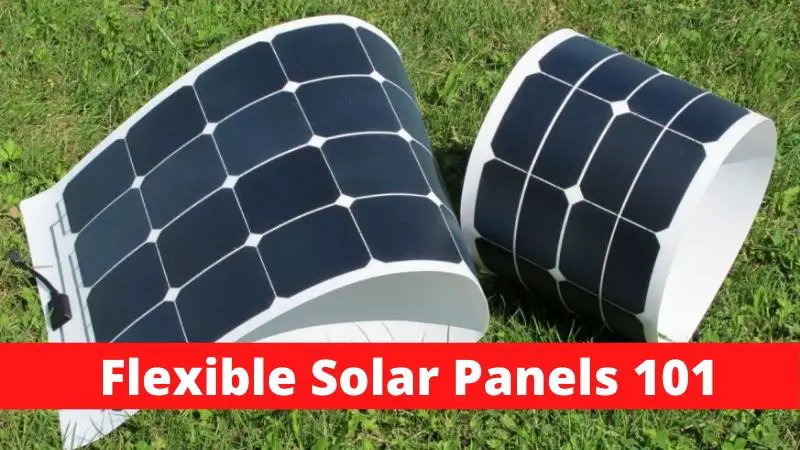
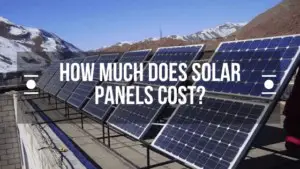
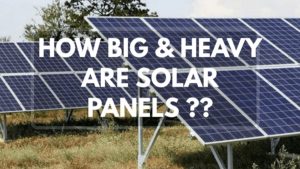
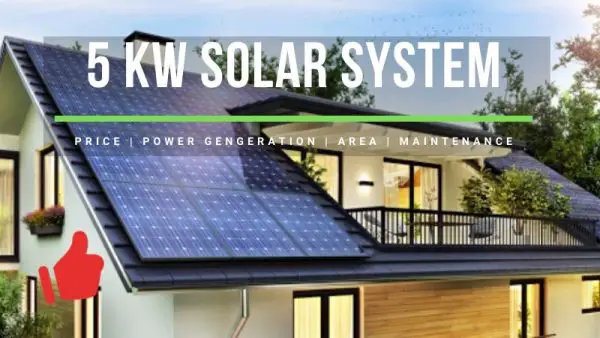
Dear sir
Plz send me the price of flexible solar panels
Bright light solar pvt ltd, In India only Waaree solar makes this flexible solar panels under their Merlin Series.
I asked them about it’s pricing they said it will be Rs 57/Watt. Other than this I don’t have any other price list. Hope this helps.
What’s up, just wanted to tell you, I enjoyed this blog post.
It was practical. Keep on posting!